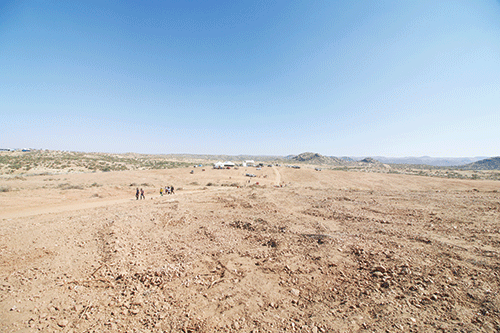Vice president Netumbo Nandi-Ndaitwah has assured the inhabitants of the Havana informal settlement that the envisioned Windhoek District Hospital, to be constructed in their area, is not an election stunt to canvas for votes, but an action plan that intends to address the shortages of referral hospitals in the country.
“We are all aware that there has been a scramble for healthcare services by the public, leading to overcrowding and capacity constraints on the part of healthcare workers. For this reason, a new district hospital is required to provide more capacity for inpatient care,” Nandi-Ndaitwah noted. She made the remarks while officiating the ground-breaking ceremony yesterday morning for the long- overdue Windhoek District Hospital to be situated in the Havana informal settlement’s Farm 108 on the outskirts of Windhoek.
Nandi-Ndaitwah indicated that the construction of the envisioned hospital does not only enhance accessibility to quality health-care services, but also serves as a catalyst for the improvement of the living conditions of the inhabitants.
She said the hospital is to be constructed at a cost of N$2.9 billion, and is envisaged to be implemented in phases over the 2023/24–2027/28 financial years. It is expected to be completed by end of 2027.
“The construction of the new hospital on these grounds is part of that broader plan. Other aspects of the plan include support to recruit, train and retain skilled healthcare workers such as doctors, nurses and other medical personnel to bridge the current staff shortages in health facilities.”
The state-of-the-art hospital will have the capacity of 500 beds, and will comprise
a day surgery facility, mothers’ lodge, pregnant mothers’ waiting lodge, staff and students’ accommodation, sports and recreational facilities, training and resource centre, clinical support services, and administration and support services.
Construction has signalled the challenges, which include shortages of healthcare personnel, ageing infrastructure, inadequate medical equipment and challenges with availability of essential pharmaceutical and clinical supplies.
“Hundreds of jobs will be created, benefiting individuals and families. Many will gain valuable skills and experience that will stand them in good stead for future employment opportunities,” Nandi-Ndaitwah said. She urged the individuals and institutions involved in this important national project to ensure that it is implemented according to the set timelines.
“This goes hand-in-hand with ensuring that the work carried out, at all stages, is of the highest quality. Let us build a facility that we will be proud of, and which will serve the Namibian people for generations.”
Health minister Kalumbi Shangula said currently, more than 85% of Namibians depend on and receive public healthcare services which are funded by the state, and rely on the 1 400 outreach points, 290 state clinics, 43 health centres, 30 district hospitals, four intermediate hospitals and one national referral hospital.
In the Khomas region, healthcare
services are provided through outreach points: 10 clinics; two health centres and the Katutura Intermediate Hospital, which serves as the district hospital in support of the facilities’ network.
The Katutura Intermediate Hospital also serves both as a referral and a district hospital. It is always congested, with patients forever complaining of long queues and long
waits. Shangula maintained that the Windhoek District Hospital is envisaged to provide for general out-patient and in-patient care in order to reduce the workload and referral patterns to the Katutura Intermediate Hospital, which will serve as a Class B facility in the referral pathway, including receiving patients from district hospitals and as a training centre for interns.
In order to fast-track the implementation of the project, an Inter-Ministerial
Technical Working Committee was established to provide policy and technical advice to the government.
The committee is composed of people from the Office of the Prime Minister, Ministries of Agriculture; Finance; Health; Urban and rural development; Works; National Planning Commission, City of Windhoek, and the professional team.
He said the construction of the hospital will be carried out in phases that include feasibility study design, town planning and environmental assessments; design, development of site reticulation services and construction; design, development and documentation of the district hospital; construction of the district hospital; and commissioning of the facility.
Meanwhile, residents of Havana have hailed the construction of a district hospital as a relief, especially for expecting
mothers who have to risk taking a taxi in the middle of the night to reach the nearest hospital.
Expressing appreciation, Helvi
Sheehama said: “I am very happy that the government has decided to bring a hospital close to the people. Currently we are getting health assistance either from Black Chain or Katutura Intermediate Hospital which is forever full.”
She also felt the construction of the hospital will create employment and
indirect benefits for small businesses such as kapana sellers.
“As the vice president said, the local people will be the first to get employment. We hope most of the youth in the area will finally get jobs,” she said.
Another resident, who identified herself as Selma, said: “We don’t have electricity, and building the hospital might result in the electrification of the whole location as well as access to potable water.”


